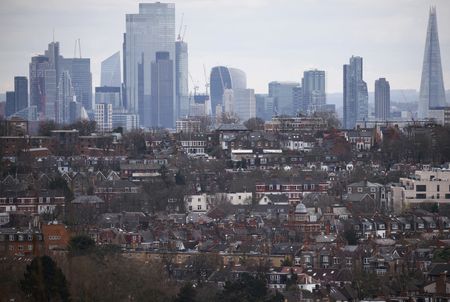By Hari Kishan and Sarupya Ganguly
BENGALURU (Reuters) – The outlook for most major housing markets has improved slightly from three months ago despite high interest rates, according to Reuters polls of property analysts who were mostly split on whether affordability would worsen or not.
House prices rose at a blistering pace across the developed world during the COVID pandemic – in some cases by more than 50% – but have fallen over the past year by modest amounts as central banks jacked up interest rates.
Higher borrowing costs have made only a small dent on the normally interest-rate-sensitive housing market, however, as still-low unemployment and a post-pandemic surge in immigration have kept demand strong amid ongoing tight supply.
The Reuters polls of around 100 analysts taken May 15-June 5 showed house prices in the U.S., Canada, Germany, Australia and New Zealand either stagnating or falling less than analysts had predicted three months ago. The outlook was little changed for Britain and in India where prices have kept rising.
“We find that very low housing supply, stronger household balance sheets…and support from rebounding immigration are all contributing to the recent house price resiliency,” noted analysts at Goldman Sachs.
“Our relatively hawkish rates forecasts and the possibility that we haven’t seen the full impact of higher mortgage rates yet suggest that the risks to house price growth remain to the downside in most countries.”
Analysts across markets covered who answered an additional question were nearly split on purchasing affordability for first time buyers, with 45 saying it would worsen and 43 saying it would improve.
Adam Challis, executive director of research and strategy for EMEA at JLL, said strong wage gains over the past year had kept many housing markets resilient despite significantly higher borrowing costs.
“But at least for now, the proportion of housing markets that were going to or at least were expected to move significantly in negative territory just hasn’t played out,” he said. “And I think it’s unlikely that will be the case now.”
Peak-to-trough falls for nearly all housing markets surveyed were downgraded from the March poll.
However, with the high risk of recession in major economies this year, a slim majority of analysts, 43 out of 81, who answered a separate question said a significant downturn was more likely for home prices than a notable rebound.
Home prices in Canada and New Zealand were forecast to drop around 9% and 8%, respectively, for the year, the most among developed economies. In Germany, the expected drop was 5.5%.
British and U.S. house prices were expected to fall around 3% and Australia’s to be flat for the full year 2023. Average house prices are expected to rise about 6% in India.
House prices are already rising in some markets, complicating central banks’ efforts to bring overall inflation under control as rental costs can make up about a third of inflation baskets.
(Reporting by Hari Kishan; other reporting and polling by Prerana Bhat, Jonathan Cable, Anant Chandak, Sarupya Ganguly, Indradip Ghosh, Vivek Mishra, Milounee Purohit, Susobhan Sarkar, Devayani Sathyan and Vijayalakshmi Srinivasan, editing by Ed Osmond)



